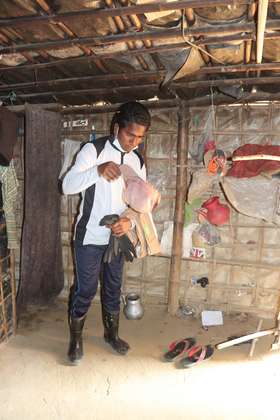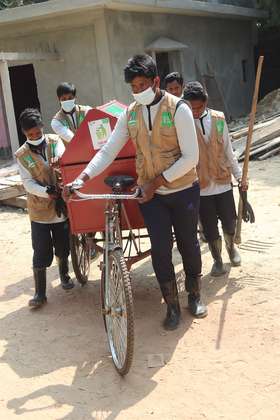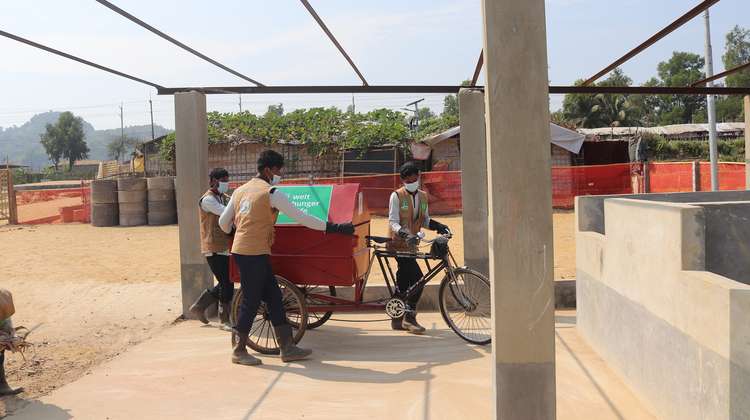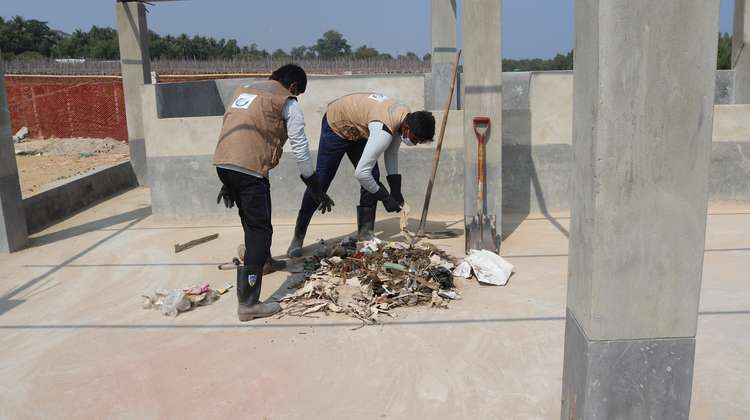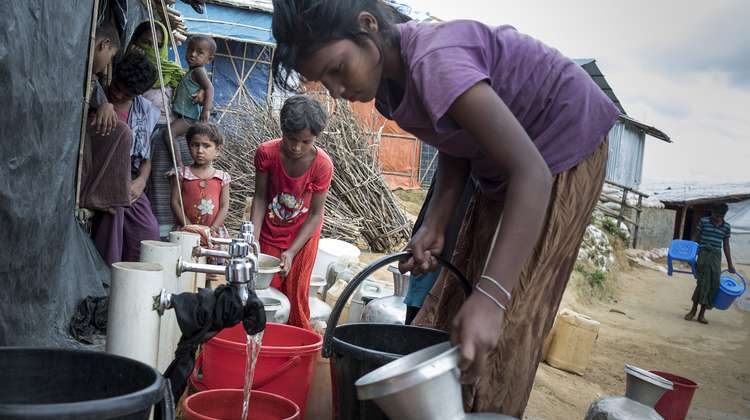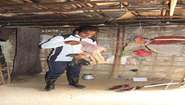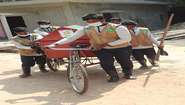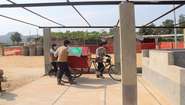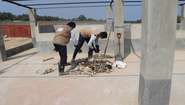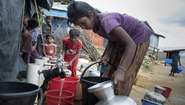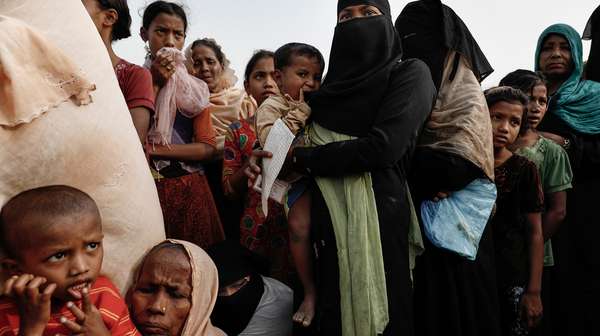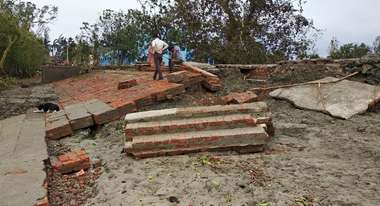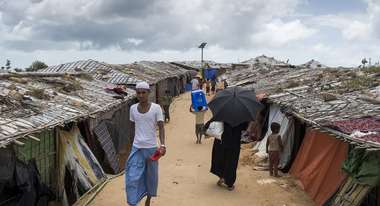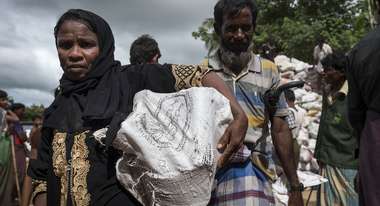Cox's Bazar in southern Bangladesh is home to the world's largest refugee camp: over one million Rohingya are seeking shelter there.
When waste becomes pride
A waste disposal system improves the hygiene situation of the people in one of the largest refugee camps in the world.

Every day, Ferozul Amin goes where there is an unpleasant smell. Voluntarily - because he wants to help eliminate the cause of the smell. The young man is a garbage collector in Camp 27 Jadimura, Cox's Bazar, Bangladesh, where around 15,000 Rohingya who have fled Myanmar have found refuge. In total, there are one million people who escaped the military's attacks on the Muslim minority in 2017. Since then, the refugees have been living in makeshift shelters made of bamboo and plastic sheets - subjected to challenges next to which issues like waste seemed beside the point. It was common practice, for example, to dispose household waste outside one's own door or in public areas. But this not only brought strife to the neighborhood, it also harbored health risks. Toxins, viruses and bacteria accumulated as a result of inadequate waste disposal and promoted diarrhea and skin diseases, while harmful substances leaked into the groundwater and the nearby sea.
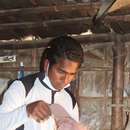
I didn't want to sit around here. When I heard that Welthungerhilfe was looking for volunteers to collect garbage, I realized: I am not worthless, not trash. I can help my community and make life in the camp better.
Ferozul AminThe garbage collection comes with the cargo bike
In cooperation with its partner organization Anando, Welthungerhilfe therefore set up a waste disposal system. Ferozul Amin is now part of the team that regularly keeps the camp clean. At eight in the morning, he slips into his uniform, puts on rubber boots, a protective mask and work gloves, and starts pedaling. He rides his cargo bike through the streets of the camp. Each household has been given a green bucket for biodegradable waste and a red one for non-compostable waste. When the buckets are full, the residents empty them into larger street waste garbage cans, the contents of which are taken to the disposal site by Ferozul Amin and his colleagues. There, the waste is composted, incinerated or recycled.
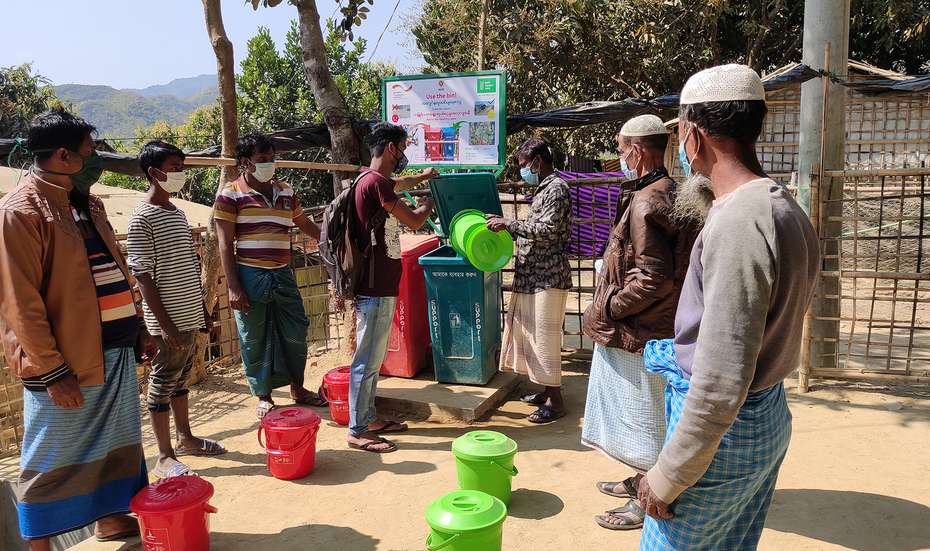
For Ferozul Amin, all this is more than a job. "When I came here, I didn't know how I was going to survive here. How long would I have to stay, and most importantly, what was I supposed to do here? Inactivity was the worst thing for many of us," the Rohingya recounts. Before the 23-year-old had to flee looting and massacres in his homeland, he had worked as a small farmer tilling his field. The work was hard, but he enjoyed doing it. "Here, I didn't want to sit around. When I heard that Welthungerhilfe was looking for volunteers to collect garbage, I realized: I'm not worthless, not trash. I can help my community and make life in the camp better," says Ferozul Amin. The work now gives his life structure again - and also a sense of purpose: "Since we started collecting the trash, it's much cleaner, there are fewer diseases, and people have to buy medicine less often. And there are fewer fights. People now know how important hygiene is; they tell me that I remind them when I come by on my tour. Everyone makes an effort."
Hygiene brings dignity back to people
For his job, Ferozul Amin receives 2,500 taka every week, the equivalent of about 25 euros. Even in Bangladesh, that's not much, but for Ferozul Amin, the small wage makes a big difference. He feels the appreciation, including that of the people in the streets, where they already know him and are grateful for what he does. It makes him proud to know that he is needed. Ferozul Amin says, "We have to take responsibility for ourselves as long as we live here and can't go home." Since the military took over the government in Myanmar in February, a return of the Rohingya in the near future has become even more unlikely.
It is therefore all the more important to make the conditions in the camp as dignified as possible. Together with Anando and financial support from the German Foreign Office, Welthungerhilfe built a drinking water system, sanitary facilities and wash houses, as well as solar lanterns to make the dark paths safer at night. Slopes on the now almost completely deforested terrain were stabilized to prevent landslides. Families received hygiene and food packages as well as wood-saving stoves for cooking. In training sessions, residents learn how to protect themselves against the coronavirus, diarrhea, cholera and other infectious diseases through hygiene. Sensitive topics are also addressed, such as child labor, marriage at a too early age and the ever-present danger of human trafficking.
Do not forget the local communities
But Welthungerhilfe also has other people in mind: the inhabitants of the host communities. One of them is Lucky Dhar from the community of Jadimura, where the huge camp suddenly sprang up almost four years ago. The mother of three says, "I grew up here, our life was easy. Then the killing started across the border, one million people fled here, and our lives changed. We did our best to give shelter, food, water and medical care to these people who had nothing left. But as much as we gave, we also lost, especially land. The prices of food and other things have gone up so much that we can no longer afford many things. Of course, we are glad that we helped. But no one helped us after that, not even the government."
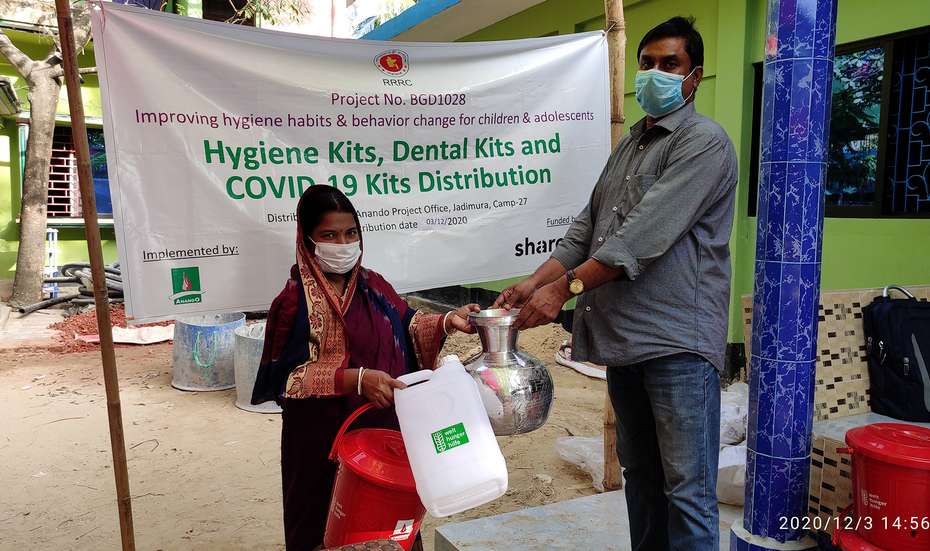
Almost a quarter of the people in Bangladesh live below the poverty line. No wonder, then, that resentment is growing where the need is even greater. To prevent conflicts between refugee Rohingya and locals, the latter are also involved in activities. Among other things, Welthungerhilfe distributed 40,000 comprehensive hygiene kits to refugees and particularly needy residents at the same time. These kits contain a water canister, personal hygiene products, protective masks, disinfectants and much more to help families stay healthy. "Our money would not be enough to buy these important things," says Lucky Dhar gratefully.
Especially now during the Corona pandemic, people are glad for the support, because Bangladesh has been hit hard by the outbreak of the virus. In the camps, however, the number of infections is significantly lower than previously feared. Experts attribute this to strict exit restrictions imposed at an early stage, as well as to the work of aid organizations that have long provided extensive hygiene facilities and raised people's awareness of the issue. Ferozul Amin has also made a contribution to this.
This text was written by Balasubramaniam Ramasubba and is taken from issue 2/2021 of our magazine (German).




